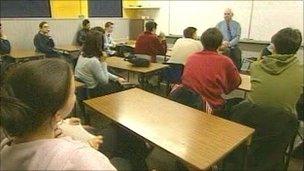Sex education 'could be better'
- Published

PSHE is part of the national curriculum in England but is not compulsory
Lessons about sex, relationships and health are not good enough in 25% of schools in England, inspectors suggest.
Teacher embarrassment and lack of knowledge were often to blame, Ofsted said in a report based on findings at 92 primary and 73 secondary schools.
It said in many secondary schools, pupils were taught about the biology of sex but not relationships.
The government says all young people should have high-quality teaching in this area.
It will take Ofsted's findings into consideration in its review of the curriculum.
Ofsted looked at personal, social, health and economic (PSHE) education in 165 schools in England.
The subject has been part of the timetable in most schools for about a decade.
Ofsted found in more than a third (34%) of the secondary schools visited, students' knowledge of sex and relationship was "no better than satisfactory", while in a further three schools it was rated "inadequate".
The report says: "Students' knowledge and understanding was often good about the biology of sex but weaker about relationships.
"They said that their sex and relationships education was taught too late and there was not enough of it to be useful.
"Discussion was sometimes limited because of the teacher's embarrassment or lack of knowledge. In these schools, the students did not have the opportunity to explore the nature of relationships in any depth. They had not discussed managing risks, saying 'no', negotiation in relationships, divorce and separation, or living in reconstituted families."
In general, Ofsted found PSHE lessons in three-quarters of the schools surveyed were good or outstanding.
But in the remaining quarter, inspectors said the quality of teaching was variable and teachers' subject knowledge and expertise were not good enough.
Chief Inspector Christine Gilbert said: "It is pleasing to see that most of the schools visited were good or outstanding at teaching the subject. However, there were some weaknesses and schools should continue to promote professional development in PSHE education so that teachers strengthen their knowledge and skills in the subject.
"In addition, some schools still struggle to teach their pupils effectively about sensitive but important issues such as the misuse of drugs and alcohol."
In over half of the secondary schools visited, inspectors found students' knowledge about the social risks and physical effects of excessive drinking was "undeveloped".
And it was a common misconception that heroin and cocaine were the drugs responsible for most deaths every year, when smoking and drinking accounted for many more deaths.
Biological facts
PSHE teaching is not compulsory in England, unlike other parts of the UK, although it is on the national curriculum.
It is only compulsory to teach the biological facts of reproduction in secondary school science lessons
Parents have the right to withdraw their children from sex education lessons.
The Labour government had planned to make PSHE a compulsory part of the national curriculum.
A spokeswoman for the Department for Education said: "This report from Ofsted is a useful assessment of PSHE education in schools.
"We want all young people to benefit from high-quality PSHE teaching and we will take this report's findings into consideration as we continue to look at the curriculum across the board."
Read some of your comments